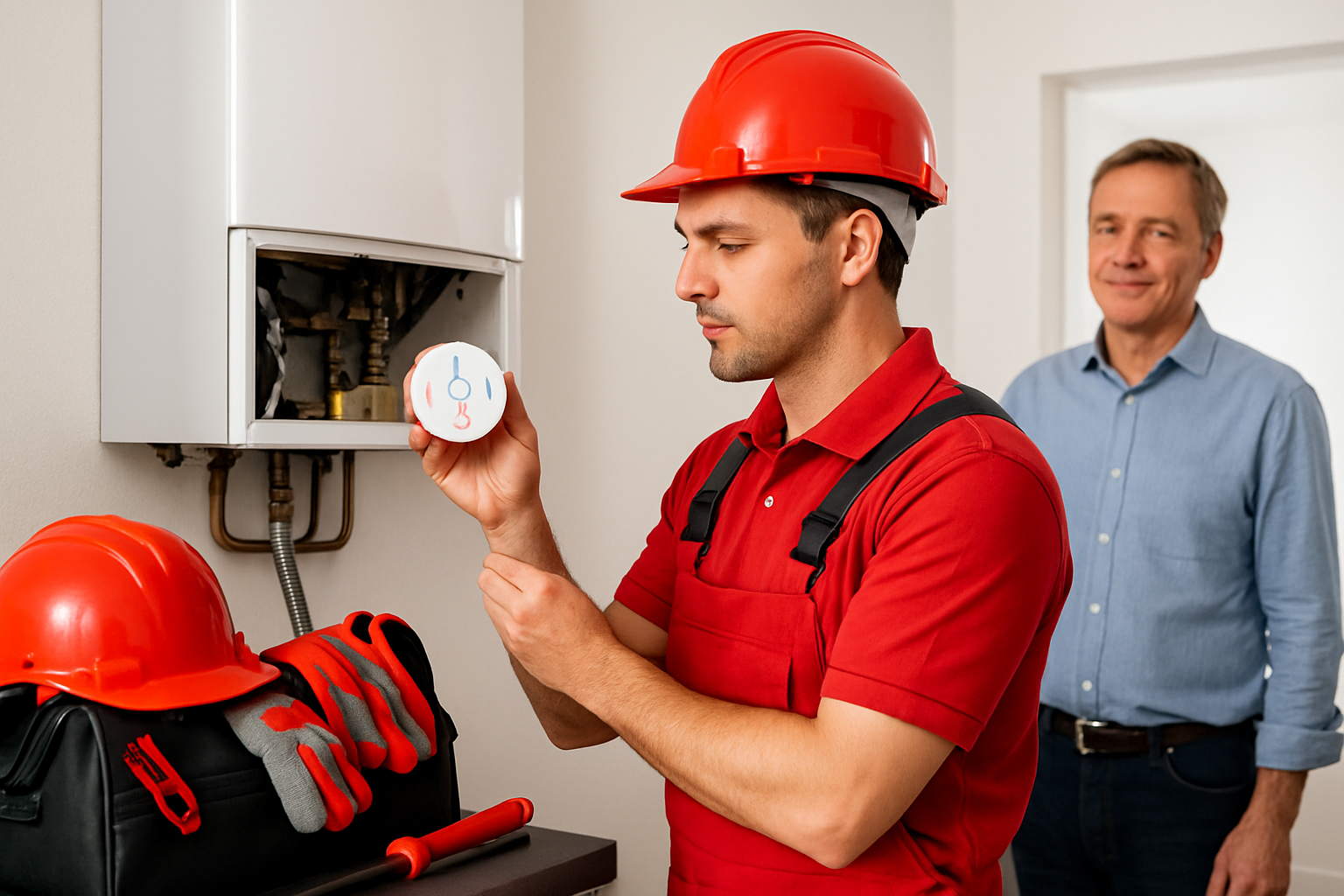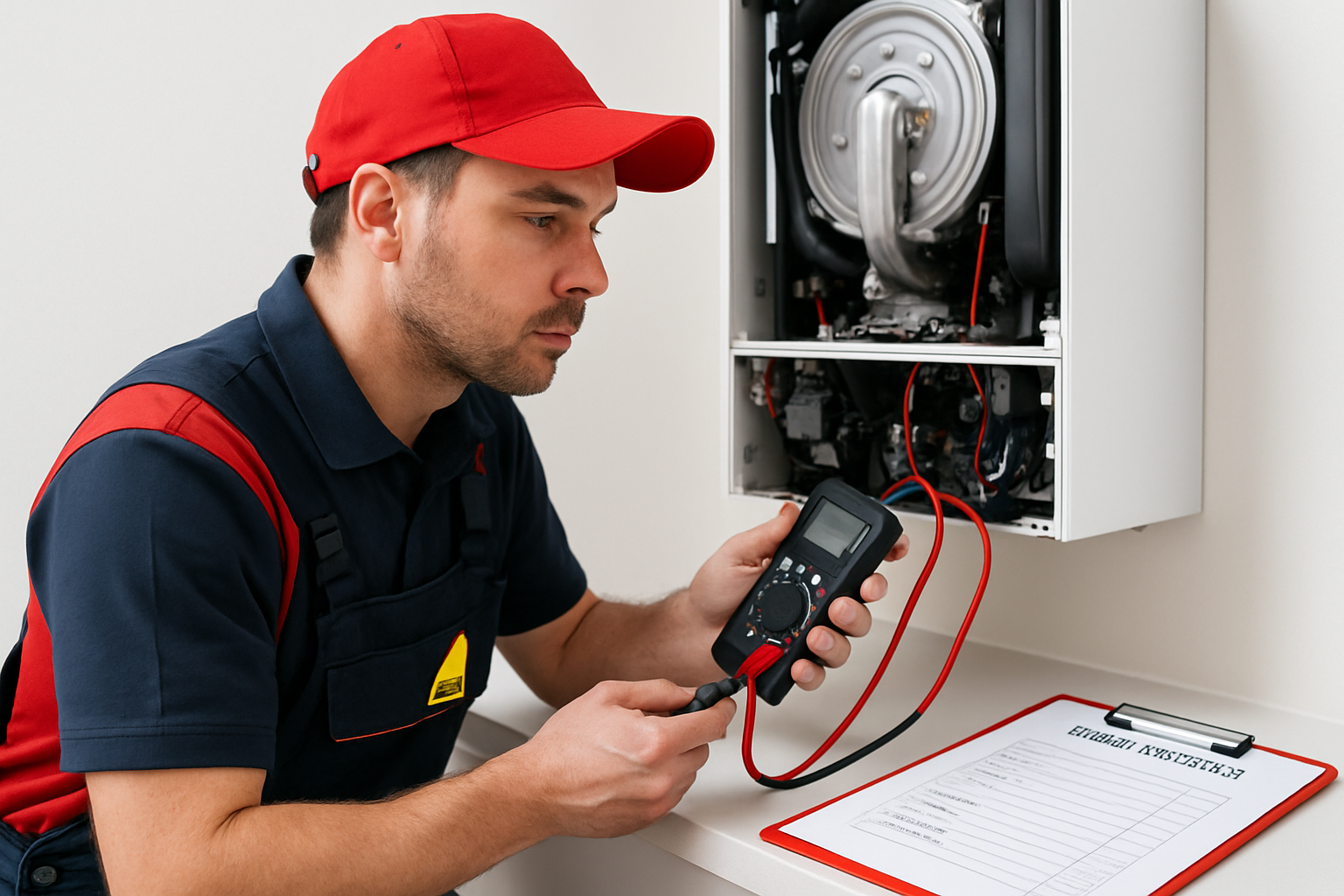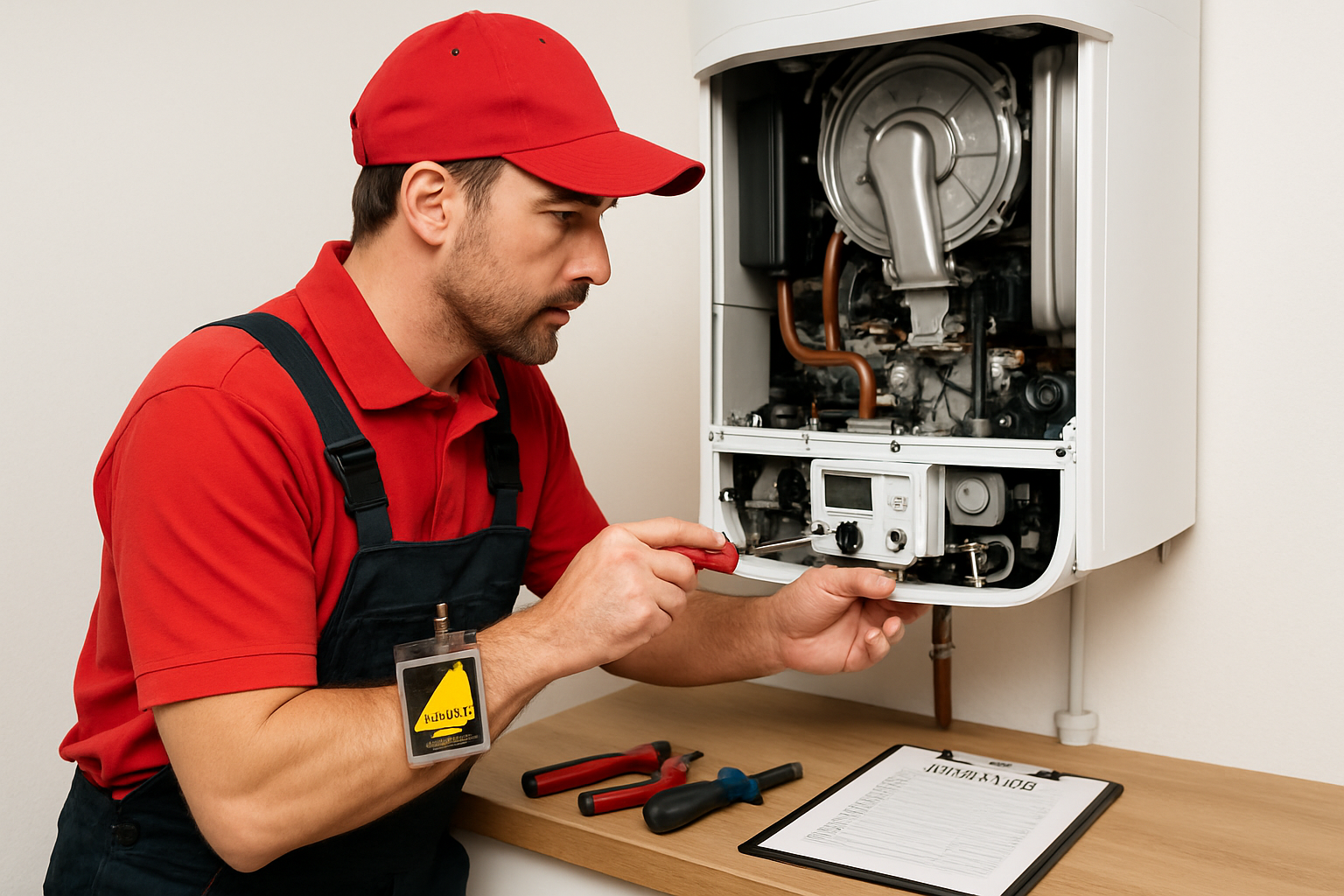Gas Boiler Service: The Complete Guide for Homeowners 2025
Is your home’s comfort and safety at risk because of a neglected gas boiler service? In 2025, staying on top of this essential task is more important than ever.
This guide gives homeowners everything they need to know about gas boiler service. You’ll discover how regular servicing protects your family, boosts efficiency, and saves you money.
Inside, we break down what a gas boiler service involves, legal and safety rules, the full step-by-step process, costs, and tips for choosing the right engineer. Ready to gain peace of mind and keep your home running smoothly? Let’s get started.
Why Gas Boiler Service Matters in 2025
A gas boiler service is more than just another item on your home maintenance checklist. In 2025, the stakes are higher than ever for keeping your boiler in top condition. Neglecting this essential task can put your household at risk, cost you money, and even break the law. Here's why a proactive approach to gas boiler service is crucial this year.

Ensuring Home Safety and Preventing Carbon Monoxide Risks
Safety is the number one reason to schedule your annual gas boiler service. Faulty boilers can leak deadly carbon monoxide, an invisible and odorless gas. According to recent Gas Safe Register statistics, hundreds of UK residents are hospitalized each year due to carbon monoxide poisoning from unserviced boilers. Tragic incidents—such as a family hospitalized after a leaking boiler went unchecked—highlight the real dangers of skipping service. Regular gas boiler service ensures all safety devices work, keeping your home protected.
Maximizing Energy Efficiency and Reducing Bills
A well-maintained boiler runs more efficiently, using less energy to heat your home. Annual gas boiler service keeps components clean and in good working order, reducing fuel consumption and cutting bills. The Energy Saving Trust estimates that regular servicing can save homeowners up to £200 a year on energy costs. For example, a neglected boiler may only run at 70% efficiency, while a serviced model can reach over 90%, making a noticeable difference in comfort and savings.
Compliance with Legal and Insurance Requirements
In the UK, gas boiler service is not just good practice—it’s often a legal and insurance requirement. The Gas Safety (Installation and Use) Regulations 1998 mandate annual safety checks for landlords, while many home insurance policies require proof of servicing. Homeowners are responsible for safe operation, and failing to comply can invalidate insurance or result in legal action. Staying up to date with gas boiler service protects you from costly penalties and ensures peace of mind.
Extending Boiler Lifespan and Avoiding Costly Repairs
Investing in gas boiler service helps catch small issues before they become expensive repairs. Engineers can spot early signs of wear, leaks, or limescale buildup, preventing breakdowns. Studies show that boilers serviced annually can last 15 years or more, while neglected units may fail in less than 10. By fixing minor faults early, you avoid emergency call-outs and repair bills that can easily exceed £300, making regular gas boiler service an investment, not an expense.
Environmental Impact and Reducing Emissions
A gas boiler service isn’t just about personal benefits—it helps the planet, too. Serviced boilers burn fuel more cleanly, reducing harmful carbon emissions. With the UK targeting significant emissions cuts by 2025, keeping your system efficient supports national climate goals. Some government incentives even reward households for maintaining low-emission heating. Regular gas boiler service means you’re doing your part for cleaner air and a greener future.
Peace of Mind for Homeowners
Knowing your boiler is safe, efficient, and compliant brings valuable peace of mind. Surveys reveal that homeowners who schedule regular gas boiler service report fewer emergency call-outs and higher satisfaction with their heating systems. You’ll rest easier knowing you’ve protected your family, finances, and property—all with one simple annual appointment.
What Happens During a Gas Boiler Service?
Ever wondered exactly what takes place during a gas boiler service? Understanding the process not only gives you peace of mind, but also helps you spot quality work and avoid unnecessary surprises. Here’s a step-by-step guide to what a professional engineer does when servicing your gas boiler.

Step 1: Pre-Service Safety Checks and Preparation
Before any hands touch your boiler, the engineer always starts with safety. They’ll introduce themselves, show their Gas Safe ID, and double-check that your property is ventilated and safe for work. Access to your boiler is cleared, ensuring nothing blocks the area.
Next, they isolate the boiler from the power and gas supply to prevent accidents. If you have pets or children, it’s a good idea to keep them out of the room during your gas boiler service. This early focus on safety sets the stage for a thorough and secure inspection.
Step 2: Visual Inspection and Component Assessment
A keen eye can spot trouble before it starts. The engineer will visually check your boiler and its surrounding pipework for signs of corrosion, leaks, or physical damage. They’ll inspect the casing for cracks, and examine the flame or pilot light, noting any irregularities in color or stability.
During a gas boiler service, they also look out for soot marks, water stains, or odd smells that might signal a deeper issue. If anything unusual is found, it’s recorded and discussed with you before proceeding.
Step 3: Internal Cleaning and System Flush
With the outer checks complete, the engineer removes the boiler casing and gets to work inside. They clean crucial parts like the heat exchanger, burner, and condensate trap, removing any built-up debris or limescale that can hamper efficiency.
This step in your gas boiler service ensures that the system operates smoothly and safely. A clean boiler not only runs better but also reduces the risk of unexpected breakdowns and maintains your warranty.
- Heat exchanger cleaned
- Burner and ignition checked
- Condensate trap flushed
Regular cleaning is key to preventing future issues and keeping your boiler in top condition.
Step 4: Testing Boiler Controls and Safety Devices
Functionality checks are critical. The engineer tests the boiler’s thermostat, pressure gauge, and all safety cut-off devices to ensure they respond accurately. They’ll also check the operation of carbon monoxide alarms and verify the integrity of the flue system.
Every gas boiler service should include these tests, as faulty controls can compromise both efficiency and safety. If adjustments are needed, the engineer will make them on the spot, keeping your system running at its best.
Step 5: Gas Pressure and Emissions Analysis
Efficiency and emissions are next on the checklist. The engineer uses a flue gas analyzer to measure combustion quality and check for dangerous gases. They’ll record readings and compare them with manufacturer specifications.
If the gas pressure is off, adjustments are made. This part of a gas boiler service not only optimizes performance but also ensures compliance with safety regulations. Lower emissions mean a greener, safer home.
Step 6: Service Documentation and Recommendations
Once the hands-on work wraps up, it’s time for paperwork. The engineer fills out a detailed service record, which you should keep for warranty and insurance purposes. They’ll flag any issues found and offer advice for ongoing maintenance.
A quality gas boiler service always includes clear documentation—don’t hesitate to ask questions or request clarification. Many reputable providers, such as those offering Gas boiler servicing in Kent, provide digital or printed service certificates for your records.
Example Service Report Walkthrough
After your gas boiler service, you’ll receive a service report. Here’s a simplified example of what to expect:
| Checklist Item | Status | Notes |
|---|---|---|
| Visual Inspection | Passed | No leaks detected |
| Internal Cleaning | Completed | Minor limescale found |
| Gas Pressure Check | Adjusted | Set to manufacturer spec |
| Safety Devices Tested | Passed | All alarms working |
| Flue Gas Analysis | Passed | Emissions within limits |
| Recommendations | Provided | Bleed radiators soon |
Review this report to ensure all sections are covered. Keep it somewhere safe, as it’s essential for future reference and insurance claims.
How to Choose a Qualified Gas Boiler Engineer
Selecting the right professional for your gas boiler service is crucial. The safety, efficiency, and longevity of your heating system depend on the skills and credentials of your chosen engineer. Here’s how to make a confident, informed choice in 2025.
Verifying Gas Safe Registration and Qualifications
Always start by confirming that your engineer is listed on the Gas Safe Register. This official UK body certifies that professionals are legally qualified to carry out gas boiler service and repairs. Request to see their Gas Safe ID card upon arrival; this should display their photo, license number, and the types of appliances they’re certified to work on. Unregistered work is illegal and could put your household at risk. For more details on why Gas Safe registration matters and how it fits into UK law, see this Gas safety regulations overview. Protect your home by never compromising on qualifications.
Experience, Reviews, and Local Reputation
Beyond certifications, look for a gas boiler service provider with a solid track record. Experience often translates to quicker diagnostics and fewer mistakes. Browse online reviews, testimonials, and local forums to gauge customer satisfaction. Ask neighbors or friends for recommendations—they may have firsthand experience with trusted engineers. A well-established reputation offers peace of mind that your gas boiler service will be thorough and reliable. Remember, a skilled engineer can spot subtle issues that others might miss, preventing future disruptions.
Transparency, Pricing, and Service Guarantees
Clear communication is essential when booking a gas boiler service. Choose companies that offer upfront, itemized quotes with no hidden fees. Ask about service guarantees and aftercare policies—these reflect the provider’s confidence in their work. Reliable engineers should explain what’s included in your gas boiler service and answer questions about potential repairs. Don’t hesitate to compare multiple quotes to ensure you’re getting fair value. Transparency builds trust and helps you avoid unpleasant surprises down the line.
Castle Heating Kent: Trusted Local Experts
For homeowners in Kent, Castle Heating Kent stands out as a top choice for gas boiler service. They’re Gas Safe registered, boast over 20 years of experience, and consistently earn five-star reviews. Their team covers Rochester, Gravesend, and the wider Kent area, offering transparent pricing and instant online estimates. Flexible finance options are available to suit different budgets. With a strong commitment to safety, reliability, and customer satisfaction, Castle Heating Kent ensures your gas boiler service is completed to the highest standards.

Gas Boiler Service Costs and What Affects Pricing
Understanding the costs of a gas boiler service helps you plan ahead and avoid surprises. With energy bills rising and new regulations in 2025, knowing what influences pricing can save you money and stress.

Typical Cost Range for Annual Boiler Service in 2025
The average cost for a standard gas boiler service in the UK ranges from £70 to £120. Prices depend on several factors, including your location, the type of boiler you own, its age, and the overall system condition.
Here’s a quick comparison of typical service costs:
| Boiler Type | Average Service Cost (2025) |
|---|---|
| Combi Boiler | £70–£110 |
| System Boiler | £80–£120 |
| Conventional Boiler | £90–£120 |
Urban areas often see higher prices due to increased demand, while rural regions may charge extra for travel. If your gas boiler service is overdue or your system is older, expect costs at the top end of the range. According to recent UK households skipping boiler servicing research, concerns about affordability are a key reason homeowners delay essential checks.
Additional Costs: Repairs, Parts Replacement, and Emergency Call-Outs
During a gas boiler service, engineers may spot issues that require immediate repairs or parts replacement. Common additional costs include:
- Replacing a faulty thermostat: £90–£150
- Fixing minor leaks: £80–£160
- Changing a gas valve: £180–£300
- Emergency call-out (outside normal hours): £120–£250
Scheduled gas boiler service visits are generally cheaper than emergency call-outs. If your engineer finds a problem, they’ll discuss repair options before proceeding, helping you avoid unexpected bills.
Service Plans and Maintenance Contracts
Service plans are a popular way to spread the cost of your annual gas boiler service. These contracts usually include the yearly check, priority breakdown cover, and discounted repairs.
Pros:
- Predictable monthly payments
- Peace of mind with emergency support
- Often includes annual safety check
Cons:
- May cost more over time than pay-as-you-go
- Some plans have exclusions or excess fees
Compare leading UK providers by reviewing what’s included and checking for hidden charges. A good plan should clearly state what your gas boiler service covers.
How to Save Money Without Compromising Safety
Want to keep your home safe and your wallet happy? Try these tips to reduce your gas boiler service expenses:
- Book servicing during off-peak months (spring or summer)
- Combine your service with other maintenance tasks, like powerflushing
- Look for multi-property or loyalty discounts if you’re a landlord
- Always use a qualified engineer to maintain warranty and insurance coverage
Cutting corners on your gas boiler service might seem tempting, but it can lead to bigger costs down the line. Investing in regular checks ensures efficiency, reliability, and peace of mind.
Essential Gas Boiler Maintenance Tips for Homeowners
Staying proactive with your gas boiler service isn’t just about ticking a box for safety or compliance—it’s about keeping your home warm, efficient, and trouble-free all year. Here, we break down essential tips every homeowner should know to maximize the performance and life of their system.
Annual vs. Interim Checks: What You Can Do Yourself
While an annual gas boiler service by a qualified engineer is crucial, there are a few simple checks you can do in between visits. These help spot early issues and keep your system running smoothly.
- Bleed your radiators to release trapped air and improve heat distribution.
- Check the system pressure gauge regularly; most boilers work best between 1–1.5 bar.
- Watch for warning lights or error codes on your display panel.
Never attempt to dismantle or repair your boiler yourself. Always leave thorough inspections and repairs to professionals as part of your scheduled gas boiler service.
Recognizing Warning Signs of Boiler Trouble
Catching problems early can save you from costly breakdowns and unsafe situations. Listen out for unusual noises, such as banging or gurgling, and keep an eye out for leaks or drops in pressure.
Common warning signs include:
- Pilot light going out repeatedly
- Unexplained increases in energy bills
- Persistent error codes on the control panel
If you notice any of these, it’s wise to consult a professional. For a deeper dive into these issues, see Common boiler problems and solutions for practical troubleshooting advice.
Keeping Your Boiler Area Safe and Accessible
A safe and accessible boiler area is key to both efficiency and emergency response. Always keep the space around your boiler clear of boxes, coats, or cleaning products. Good ventilation is essential for safe operation and helps prevent overheating.
Make sure nothing blocks the flue or air vents. This not only supports optimal performance but also makes it easier for engineers to carry out your gas boiler service efficiently.
Protecting Your Boiler in Winter
Cold snaps can catch even a well-serviced boiler off guard. Take steps to protect your system when temperatures drop.
- Insulate (lag) exposed pipes to prevent freezing.
- Use your heating periodically, even if you’re away, to keep water moving.
- Set your thermostat to a frost protection mode if available.
These tips work hand-in-hand with your regular gas boiler service to keep winter worries at bay.
Smart Controls and Boiler Efficiency
Modern smart thermostats and heating controls can transform your boiler’s efficiency. By learning your routine and adjusting heating patterns, they help reduce unnecessary energy use and cut costs.
Some smart systems provide usage reports and remote access for even greater control. Integrating these features with your regular gas boiler service ensures your system stays at peak performance throughout the year.
Record Keeping and Service Reminders
Keeping a logbook of every gas boiler service is more than just paperwork—it’s vital for warranty, insurance, and future resale value. Record the date, engineer’s details, and any recommendations after each visit.
Set digital reminders on your phone or calendar for annual servicing. This simple habit ensures you never miss a vital check-up and keeps your heating system in top shape.
Frequently Asked Questions about Gas Boiler Service
Curious about gas boiler service? This FAQ clears up the most common concerns homeowners have about keeping their boilers safe, efficient, and compliant. Get quick, actionable answers to help you make the best decisions for your home.
How often should I service my gas boiler?
It's recommended to schedule a gas boiler service once every 12 months. Annual servicing helps keep your system efficient, safe, and within warranty. Most manufacturers and insurance providers require proof of yearly servicing to maintain coverage. Skipping a service could lead to breakdowns or voided warranties.
What’s the difference between a boiler service and a safety check?
A full gas boiler service is a comprehensive process. It includes cleaning, component checks, gas pressure analysis, and efficiency testing. In contrast, a safety check is a basic inspection to ensure the boiler isn’t posing immediate danger. Only a full service guarantees optimal performance and long-term safety.
Can I service my boiler myself?
No, you should never attempt a gas boiler service on your own. UK law requires all gas work to be completed by a Gas Safe registered engineer. DIY attempts can be dangerous and illegal. For small troubleshooting, such as learning how to fix a leaking boiler, always follow professional advice and call an engineer for anything beyond basic checks.
How long does a typical service take?
A typical gas boiler service takes about 45 to 60 minutes. The time can vary based on the boiler's age, condition, and type. If extra cleaning or repairs are needed, expect your engineer to spend a bit longer ensuring everything is safe and efficient.
What should I do if my boiler fails after a service?
If your boiler fails after a gas boiler service, contact the engineer who performed the work. Most reputable companies offer short-term guarantees for their service. Check your warranty and service paperwork for details. Avoid attempting repairs yourself—professional help ensures your system remains safe and compliant.
Are there new regulations for 2025 I should know about?
Yes, gas boiler service regulations are updated regularly. In 2025, the UK continues to tighten standards around emissions, safety, and efficiency. Stay informed by following trusted sources and reading updates on topics like the pros and cons of gas boilers. Always use a Gas Safe registered engineer to remain compliant.
Does regular servicing affect my home insurance?
Most home insurance policies require proof of annual gas boiler service to validate claims related to boiler faults. Failing to service your boiler could result in denied claims if issues arise. Always keep documentation of every service to protect your coverage.
What paperwork should I receive after a service?
After a gas boiler service, your engineer should provide:
- A detailed service record or certificate
- Notes on any issues or repairs needed
- Confirmation of Gas Safe registration
Keep these documents safe for warranty and insurance purposes. Digital copies are also helpful for easy reference.
Now that you know how important regular gas boiler servicing is for your home’s safety, efficiency, and peace of mind, why not take the next step? If you’re in Kent—including Rochester or Gravesend—and want to make sure your boiler is in expert hands, you can trust the team at Castle Heating Kent. We’re Gas Safe registered, experienced, and committed to keeping your heating running smoothly all year round. Have questions or ready to book your service? Call Now on 01634790511 or 0800 0016511 for friendly, professional advice and to secure your appointment.

